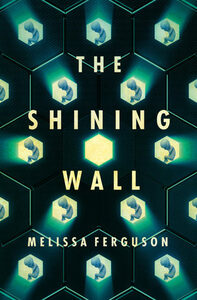Take a photo of a barcode or cover
Not my usual style but a great book. Characters were believable, great storyline and well written. A few queries popped up at the end to reduce from 5 stars. It was a unique topic and I enjoyed it.
A desperate future
In The Shining Wall, Ferguson has given us a dangerous and disturbing glimpse into the future. She has mashed together a ruined world, the dire straights of what's left of humanity, their reliance on flawed technology, and their plundering of the past in a well crafted plot. Not content with turfing their lower class, diseased masses out beyond the walls of City 1, the upper echelons and Leader Corps have recreated their own worker class Neo-Neandertals. As always, humans, be they sapien or neandertal, underestimate the individual's need for survival and connection. No matter how desperate the future, the characters still want a part of it. Ferguson's characters are relatable and reprehensible, everything you need in this brutal, climate challenged tale. She is uncompromising in delivering on its promise.
A great read.
In The Shining Wall, Ferguson has given us a dangerous and disturbing glimpse into the future. She has mashed together a ruined world, the dire straights of what's left of humanity, their reliance on flawed technology, and their plundering of the past in a well crafted plot. Not content with turfing their lower class, diseased masses out beyond the walls of City 1, the upper echelons and Leader Corps have recreated their own worker class Neo-Neandertals. As always, humans, be they sapien or neandertal, underestimate the individual's need for survival and connection. No matter how desperate the future, the characters still want a part of it. Ferguson's characters are relatable and reprehensible, everything you need in this brutal, climate challenged tale. She is uncompromising in delivering on its promise.
A great read.
Three and a half rounded up to four
It was a bit messed up reading this dystopian novel while the local environment was a bit dystopian and friends were getting caught up in the fires and the air being toxic
It was a bit messed up reading this dystopian novel while the local environment was a bit dystopian and friends were getting caught up in the fires and the air being toxic
DNF @ 25%
Characters didn’t feel fully fleshed out or believable.
The connections (or possible future connections) between the characters seemed hinky or not plausible.
The plot either too slow or non existent.
Pacing was just off the mark.
The world in this story and how it came to be not a really explained or written in a way early on that it’s understood early on.
Whatever conflict was going on I didn’t really understand - how/why/what/who etc.
Felt no compulsion to pick up and read it.
Characters didn’t feel fully fleshed out or believable.
The connections (or possible future connections) between the characters seemed hinky or not plausible.
The plot either too slow or non existent.
Pacing was just off the mark.
The world in this story and how it came to be not a really explained or written in a way early on that it’s understood early on.
Whatever conflict was going on I didn’t really understand - how/why/what/who etc.
Felt no compulsion to pick up and read it.
‘She loved Mum, but there was only so far love could take you in life.’
In this ruined world, the shining wall protects the haves from the have-nots. Inside the wall, wealthy humans live their long and privileged lives, supported by technology and cloned Neandertals. And by services provided by women living outside the wall. Outside the wall, in the demi-settlements, where poverty and disease are rampant, people must scavenge for food and other essential supplies. They also need to avoid the ever-present security forces. Avoidance is difficult when so much of life is controlled by OmniScreens and implanted microchips.
This is where Alida (aged 17) and Graycie (aged 5) live, with their mother. Until they are orphaned. Then their already difficult lives become more challenging. Alida can make money, if she sells her body. They meet Shuqba, a cloned Neandertal, posted outside the city. Shuqba is under strict orders, which she struggles to align with her feelings. Shuqba helps Alida and Graycie.
‘Everything was a transaction to them. If the cost exceeded their benefit, there was no point.’
Graycie becomes ill. Desperate to save her life, Alida makes a decision which separates them.
I quickly became immersed in the awfulness of this dystopian world. It’s not hard to imagine a world in which implanted microchips and software controls lives. It’s not hard to picture a world in which a privileged minority control the majority. It’s even easier to relate to a world in which a wall divides the haves from the have-nots. But this novel, with its details of everyday life and its descriptions of power struggles makes what should (just) be fiction unsettlingly close. People harvested for organs, women being used to incubate children for the privileged are real, even if cloned Neandertals are not (yet).
‘What were security and comfort if you had no control over your own body?’
For me, this was a story that I could not put down. I wanted to know how it would end. I wanted …
Jennifer Cameron-Smith
In this ruined world, the shining wall protects the haves from the have-nots. Inside the wall, wealthy humans live their long and privileged lives, supported by technology and cloned Neandertals. And by services provided by women living outside the wall. Outside the wall, in the demi-settlements, where poverty and disease are rampant, people must scavenge for food and other essential supplies. They also need to avoid the ever-present security forces. Avoidance is difficult when so much of life is controlled by OmniScreens and implanted microchips.
This is where Alida (aged 17) and Graycie (aged 5) live, with their mother. Until they are orphaned. Then their already difficult lives become more challenging. Alida can make money, if she sells her body. They meet Shuqba, a cloned Neandertal, posted outside the city. Shuqba is under strict orders, which she struggles to align with her feelings. Shuqba helps Alida and Graycie.
‘Everything was a transaction to them. If the cost exceeded their benefit, there was no point.’
Graycie becomes ill. Desperate to save her life, Alida makes a decision which separates them.
I quickly became immersed in the awfulness of this dystopian world. It’s not hard to imagine a world in which implanted microchips and software controls lives. It’s not hard to picture a world in which a privileged minority control the majority. It’s even easier to relate to a world in which a wall divides the haves from the have-nots. But this novel, with its details of everyday life and its descriptions of power struggles makes what should (just) be fiction unsettlingly close. People harvested for organs, women being used to incubate children for the privileged are real, even if cloned Neandertals are not (yet).
‘What were security and comfort if you had no control over your own body?’
For me, this was a story that I could not put down. I wanted to know how it would end. I wanted …
Jennifer Cameron-Smith



